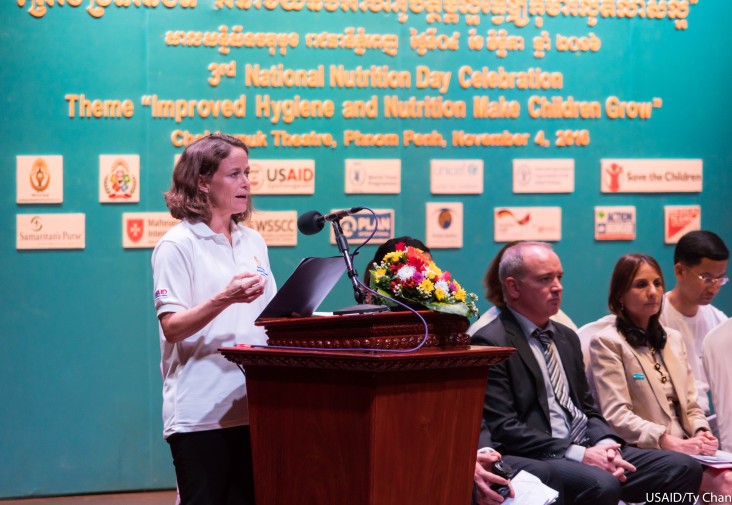
(as prepared for delivery)
Your Excellency, Dr. Yim Chhay Ly, Deputy Prime Minister and Chairman of CARD
Your Excellency OK Rabun, Minister for the Ministry of Rural Development;
Your Excellency Veng Sakhon, Minister for the Ministry of Agriculture, Forestry and Fisheries;
Your Excellency, Mr. Ngy Chanphal, Secretary of State of the Ministry of Interior and Vice Chairman of CARD;
Mr. Keith Porter, Executive Director, Helen Keller International;
Ms. Debora Comini, UNICEF Representative;
Ladies and gentlemen;
It is an honor to be here today and to be speaking on behalf of development partners. We are encouraged by the great progress that Cambodia has made in reducing hunger and stunting in Cambodia since 2000. The recent 2016 Global Hunger Index Report results show that Cambodia is one of three countries with largest percentage of hunger reduction among the 50 countries with serious levels of hunger. This improvement is great news.
In addition, we are very excited to see that the Cambodian government is prioritizing a multi-sectoral approach to fighting malnutrition in the 2014-2018 National Strategy for Food Security and Nutrition.
We are pleased to have provided technical and financial support to these efforts. The future of Cambodia is synonymous with that of its children and we will continue to help make sure they eat well, grow up healthy, and contribute to their country’s growth. Although there have been excellent advances made in improving malnutrition, we all know that there is still much work to be done.
We know that malnutrition is a complex issue that requires intervening in the first 1,000 days of life to prevent permanent damage to children. To prevent stunting, wasting, and undernutrition, we know that children need to eat right and have access to quality health and nutrition services. Their families also need access to clean water, proper sanitation, and the knowledge to practice good hygiene.
Today, our theme is “Improved Hygiene and Nutrition Make Children Grow.” We know that there are inexpensive, easy-to-scale solutions that will help Cambodians take better care of their health and prevent the contamination of water and food. Simple interventions can avoid the problems that do not allow children to absorb nutrients.
A recent study estimates that almost 60 percent of diarrhea is caused by unsafe water, lack of sanitation, and poor hygiene behaviors. A simple personal practice of proper hand washing at critical times can help reduce risk of diarrhea more than 42 percent. Safe drinking water can reduce risk of diarrhea to the same extent as hand washing. We know that improved sanitation can reduce diarrheal disease rates by as much as one-third. A vicious cycle exists between diarrhea and undernutrition, as children with diarrhea eat less and are less able to absorb the nutrients from their food. Malnourished children have weakened immunity and are more susceptible to diarrhea when exposed to fecal material from their environment.
Our flagship nutrition project, NOURISH, has shown how people in the poorest villages in Battambang, Pursat, and Siem Reap can be taught to easily make hand washing stations from empty plastic bottles. They also showed us how entire villages can ensure that feces is disposed of properly and how ready Cambodians are to install and use latrines. The German Ministry of Economic Cooperation and Development’s “One World No Hunger” Special Initiative has taken a similar integrated approach to addressing malnutrition in Kampong Thom and Kampot. These are not only encouraging but they are saving and improving the lives of Cambodian children.
How do we keep the momentum going? We do it together. Development partners, civil society, and our UN colleagues - we need to support the government’s efforts to scale up these proven interventions throughout the country. If we all pitch in to improve hygiene and nutrition – we can help children grow and – equally as important – we can help Cambodia grow, too.
Thank you.
Related Speeches
- Remarks by Polly Dunford, Mission Director, USAID Cambodia, Launch Event of Feed the Future Cambodia Harvest II
- Remarks by Christina Lau, Deputy Director, Office of Public Health and Education, USAID/Cambodia, Opening Ceremony of the Kick-Off Workshop for “One Health Workforce”
- Remarks by Veena Reddy, Deputy Mission Director, USAID Cambodia, EPIC Showcase







Comment
Make a general inquiry or suggest an improvement.